About the New York Bookeller Documentary 'BOOKWARS'
Summary
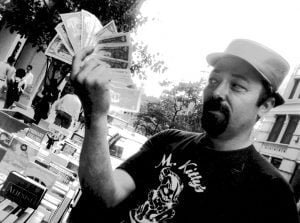 The New York bookseller documentary BookWars is an independent film by Jason Rosette (produced by Camerado Media) about the life and times of New York City street booksellers.
The New York bookseller documentary BookWars is an independent film by Jason Rosette (produced by Camerado Media) about the life and times of New York City street booksellers.
Made on an ultra-low budget in a jazzy, impressionistic style reminiscent of the films of Robert Frank and poetry of the Beat Generation, BookWars is notable as the only first-person documentary made during then-New York City Mayor Rudolph Giuliani's controversial "Quality of Life" campaign, which sought to limit and control individuals engaged in informal economic activities on the streets of New York City.
BookWars was released in June 2000, winning the Best Documentary Award at the 2000 New York Underground Film Festival and premiering theatrically at New York's Cinema Village. An advance screening review by New York Film Critics Circle critic Matt Seitz called the film 'Superb' and 'Mesmerizing' , with numerous other positive reviews following.
Despite its very modest budget, BookWars enjoyed numerous domestic and international TV sales, and is now part of the Circulating Film and Video collection at the Museum of Modern Art, New York.
Synopsis
 The gritty world of New York City street booksellers is exposed in a remarkable story that chronicles their lives and loves and their unique perspectives on life. Made on location at the sidewalk book tables of New York by a fellow street bookseller, BookWars explores the other side of the book tables along the streets of the Village, on the Lower East Side, along 6th avenue, and elsewhere in New York City.
The gritty world of New York City street booksellers is exposed in a remarkable story that chronicles their lives and loves and their unique perspectives on life. Made on location at the sidewalk book tables of New York by a fellow street bookseller, BookWars explores the other side of the book tables along the streets of the Village, on the Lower East Side, along 6th avenue, and elsewhere in New York City.
See the Mayor, the University and the NYPD try to shut them down!
Production
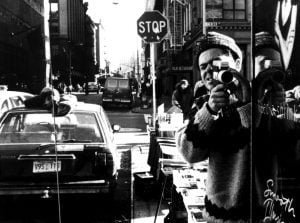 About New York Booksellers Documentary BookWars: The concept for BookWars was developed after a chance meeting between filmmaker Jason Rosette and New York documentarian Michel Negroponte. An NYU Film School graduate, Mr. Rosette had been selling used and out of print books at a street-side bookstand in Greenwich Village to generate cash between film production and editing jobs.
About New York Booksellers Documentary BookWars: The concept for BookWars was developed after a chance meeting between filmmaker Jason Rosette and New York documentarian Michel Negroponte. An NYU Film School graduate, Mr. Rosette had been selling used and out of print books at a street-side bookstand in Greenwich Village to generate cash between film production and editing jobs.
In 1995, the filmmaker had interned briefly on a documentary production and met Mr. Negroponte. Not long after, Mr. Negroponte happened upon Mr. Rosette at his sidewalk book stand, and the two began discussing the idea of documenting the world of sidewalk bookselling from a first-person point of view.
Mr. Rosette and fellow bookseller 'Slick' Rick Sherman had already been bringing a video camera on occasion to the book stand to document fellow booksellers and day-to-day life on the sidewalks of New York. With a documentary concept in place, he began to bring a video camera daily to document the sights and sounds of the city of New York as seen from the perspective of a sidewalk bookseller.
 Because this initial phase of shooting was funded completely out of pocket, BookWars was produced in a variety of film and video formats depending on whatever camera was available at the time. Shooting formats included: Mini DV, Super 8 film, Regular 8 and Hi-8 video, and Super VHS. The aesthetic goals of immediacy and a natural, unobtrusive presence of the camera also demanded the use of small format film and video.
Because this initial phase of shooting was funded completely out of pocket, BookWars was produced in a variety of film and video formats depending on whatever camera was available at the time. Shooting formats included: Mini DV, Super 8 film, Regular 8 and Hi-8 video, and Super VHS. The aesthetic goals of immediacy and a natural, unobtrusive presence of the camera also demanded the use of small format film and video.
Initial production was financed by the sale of used and out-of-print books at the filmmaker's book stand. As more books were sold, more film and video stock could be purchased, and production would continue.
Heading Out West
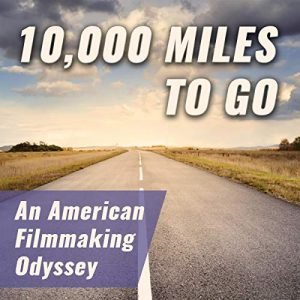
Listen to the making of 'BookWars' in the audiobook, '10,000 Miles to Go' - available on Audible, Spotify, and other platforms!
Following the initial stage of shooting in New York, director Jason Rosette drove from New York to New Mexico where he had edited an earlier film at a colleague's Albuquerque-based production studio. Free use of an offline tape-to-tape system had been offered in order to produce a rough edit.
In New Mexico in 1996, the first assembly of the movie, then called The Book Wars, was edited on a tape-to-tape analogue system. That rough assembly was screened for the first time in on Super Bowl Sunday in 1996 as part of an exhibition produced by Basement Films of Albuquerque.
Given that inexpensive nonlinear desktop editing solutions were not widely available at the time - and were expensive to rent - the filmmaker next drove out to Los Angeles with the assembly edit in hand. The goal was to secure access to one of the two primary nonlinear systems available at the time – an Avid or Media 100 system.
While the filmmaker sought post-production equipment in Los Angeles, a San Francisco- based production company, S.A.I.D. Communications, viewed the assembly edit of BookWars after listening to an early version of the proposed narration. About New York booksellers documentary BookWars: Producers John and James Montoya of S.A.I.D agreed to provide additional editing and production in order to complete the picture.
San Francisco
Mr. Rosette subsequently departed Los Angeles for San Francisco, and commenced to work on editing the documentary there full-time.
There was no up-front money to continue editing - and still no funding despite many grant applications - so the director worked a variety of jobs to sustain himself and production of the movie, working as a freelance film editor, bicycle cab driver, voice-over artist, and an assortment of temporary and odd jobs.
A rough cut of BookWars was finally achieved in 1998. However, additional material was required to create a coherent feature edit. S.A.I.D Communications provided a camera on loan, and director Jason Rosette headed back to New York to spend time once again with his fellow booksellers to continue documenting their lives.
After this second stage of shooting in New York was complete, in 1998, Mr. Rosette returned to San Francisco to include the additional essential sequences in the final edit. While the filmmaker was away, however, S.A.I.D. had already commenced post-production on the San FRancisco stripper unionization documentary Live Nude Girls Unite! The BookWars team had to defer to the new incoming production.
Still No Funding
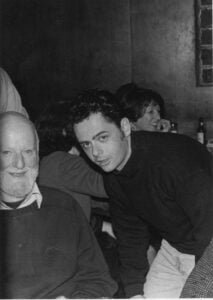
Lawrence Ferlinghetti with 'BookWars' filmmaker Jason Rosette in San Francisco during editing of the booksellers documentary
The filmmaker had by now spent nearly three years in San Francisco, endeavoring to complete BookWars without having received any grants or external funding. Grant administrator Armin Rosencranz of The Pacific Pioneer Fund explained that, while he considered BookWars to be a worthy and compelling project, he felt that the filmmaker “would have to be a genius to pull it off” (*funding was denied).
At the same time, Beat writer and publisher Lawrence Ferlinghetti of City Lights Bookstore viewed the cut of BookWars, and applauded it as being “Anarchistic”.
Delays continued and post production paused while an online nonlinear editing system in the San Francisco area was sought, unsuccessfully. Finally, co-producer Michel Negroponte contacted the filmmaker regarding an editing station that had become available in New York City; payment to the machine's owners could be deferred until the movie was completed and sold.
The filmmaker thus returned to New York to complete the final edit of the documentary. During this time, German-French broadcasting group Arte/ZDF received the nearly-completed cut of the BookWars . Buyer Doris Heppe committed to purchasing the hour-long broadcast version for airing, while providing an advance to enable completion of the final edit, mix, narration, and post-production of the program.
Shortly after announcing this key initial TV sale, The Playboy Foundation and the Experimental TV Center both subsequently awarded modest post-production grants.
First Screenings
The work in progress cut of BookWars screened at the Independent Feature Project’s Independent Feature Film Market. Shortly after, the nearly complete fine cut of BookWars debuted at the New Filmmakers New York series at Anthology Film Archives in the Spring of 2000.
 Several months later, the final theatrical version of Bookwars was completed. The movie had its world premiere at the 2000 New York Underground Film Festival, where it won the Best Documentary Award. Though the filmmaker was temporarily banned from the festival venue (Anthology Film Archives) due to over-zealous guerilla promotional activities, BookWars nonetheless soon enjoyed a New York theatrical premiere at the Cinema Village Website, and went on to screen theatrically and air at numerous international and domestic channels and venues.
Several months later, the final theatrical version of Bookwars was completed. The movie had its world premiere at the 2000 New York Underground Film Festival, where it won the Best Documentary Award. Though the filmmaker was temporarily banned from the festival venue (Anthology Film Archives) due to over-zealous guerilla promotional activities, BookWars nonetheless soon enjoyed a New York theatrical premiere at the Cinema Village Website, and went on to screen theatrically and air at numerous international and domestic channels and venues.
In total, production of BookWars had taken five years and 20,000 miles of travel across the United States to complete.
Afterwards
A book and audiobook titled 10,000 Miles to Go: An American Filmmaking Odyssey, about the unusual physical and creative process behind the making of BookWars, was published in 2015.
In 2016, BookWars was entered into circulation at the Museum of Modern Art (New York) Circulating Film and Video library, and enjoyed its 2nd screening at MoMA in 2019.
BookWars has since gained a niche following in both the bookselling world and the indie film world in general, achieving the status of 'contemporary indie classic documentary'.
The film continues to screen to this day, with scripted and unscripted followup projects in development.
Plot
BookWars is a creative documentary which is told in an unconventional, narrative style. The film opens with the narrator (who is also the film's director) driving out West along a desert highway, relating to a suggested passenger (the viewer) his previous experiences as a street side bookseller in New York City.
The entire documentary – including the central events involving his experiences among the street booksellers in New York – is thus "told" as a long conversation.
The narrator describes his post-graduation years in New York, and how he ended up at one point virtually penniless.
Driven by a desperate need to pay the rent, he resorts to wheeling his own books out to the street to try to sell them. He reveals that he was not only successful in making a significant amount of cash on that first day, but he has also met a variety of interesting and strange characters of the streets of New York – including other street booksellers.
A motley assortment of street booksellers on West 4th street, in Greenwich Village, New York City, are first introduced.
Introducing the Booksellers
 Among them: “Slick” Rick Sherman, a semi-professional magician; Al Mappo, so named because he only sells maps and atlases; Emil, who says only he "escaped”, though we do not know from where; and Pete Whitney: 'King of the Booksellers', toad collector, and collage artist.
Among them: “Slick” Rick Sherman, a semi-professional magician; Al Mappo, so named because he only sells maps and atlases; Emil, who says only he "escaped”, though we do not know from where; and Pete Whitney: 'King of the Booksellers', toad collector, and collage artist.
BookWars next introduces another group of street booksellers who hawk their trade on nearby 6th Avenue. Mainly black and minority individuals, they ply books and magazines in parallel fashion to the nearby West 4th street booksellers, who are primarily white. The booksellers on 6th Avenue suffer greater exposure to the law, with many claiming this to be due to racial profiling.
Some of the significant personalities that are introduced on 6th Avenue include: Marvin, always wearing his trademark black hat; Ron, from Jamaica – charismatic, streetwise and outspoken; Grady (whose books are seen confiscated by the NYPD later in the film); and Mudrick, better known as 'Slim'.
After the introduction of the primary characters (including the narrator bookseller himself), BookWars discusses, mainly through informal testimony, the various aspects of the street bookseller's life in chapter-by-chapter fashion.
Tools of the Trade
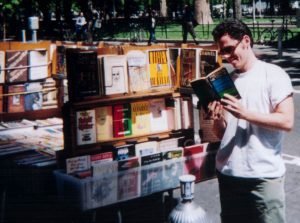 The tools and tricks of the street bookseller's trade are revealed: ways and techniques to maximize income; how to deal with difficult, and sometimes dangerous customers; and where and how to get more books.
The tools and tricks of the street bookseller's trade are revealed: ways and techniques to maximize income; how to deal with difficult, and sometimes dangerous customers; and where and how to get more books.
A chapter of BookWars also reveals how the booksellers have a right to distribute literature (commercially or otherwise) in public, as per the First Amendment to the United States Constitution.
BookWars is structured as a “year in the life” style movie, although the film was actually produced over several seasons, from 1995 to 1999. When winter comes, and the streets are too snow-filled and cold to hawk books, the booksellers are shown in their various off-season modes and occupations. “Slick” Rick performs card and magic tricks at parties; Pete Whitney grooms cats for old ladies; and the narrator heads out to New Mexico to work on a Western*. (*Which was actually a movie called The Desperate Trail IMDB)
Marv and Ron, however, continue to sell books throughout the winter on busy 6th Avenue, and the film follows them as they scour for books and pornographic magazines in the trash in Soho.
Finally, Spring comes, and the booksellers emerge from their off-season to sell books as usual for another season – or so they think. BookWars proceeds to reveal the street-level effects of then-New York City Mayor Rudolph Giuliani’s controversial “Quality of Life” campaign, which sought to remove informal, unregistered entrepreneurs and other individuals from the streets of New York City.
Quality of Life
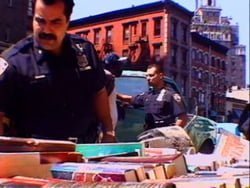 When Rudolph Giuliani was elected Mayor of New York City in 1993, he devised a program colloquially referred to as 'Quality of Life'. The proposed aim was to clean up the city of New York in adherence to sociological/criminological notions of the 'Broken Window Theory.'
When Rudolph Giuliani was elected Mayor of New York City in 1993, he devised a program colloquially referred to as 'Quality of Life'. The proposed aim was to clean up the city of New York in adherence to sociological/criminological notions of the 'Broken Window Theory.'
The NYPD begins to enforce obscure technicalities which govern the uses and dimensions of the sidewalks, thereby making it more difficult to earn a livelihood. A new tax identification number requirement is introduced, creating bureaucratic obstacles, especially for those street booksellers who are marginal or virtually homeless.
Nearby New York University unlawfully places imposing, massive planters on the sidewalk in an attempt to drive the street booksellers away. Finally (especially on 6th Avenue where the majority of black street booksellers are active) the NYPD comes to confiscate and haul away books.
What was worth cleaning up was of course subjectively determined by those intent on doing the cleaning.
Besides "unsavory" institutions like porn shops, New York's Quality of Life plan was also designed to control and limit individuals who existed outside of the system, especially those who lived on or made a living on the street.
The first targets were the most visible and also the least organized (and therefore the most defenseless): the homeless and the semi-homeless, ala, the once-ubiquitous squeegee guys.
Inevitably, street vendors of all sorts were challenged, including street booksellers all over the city--despite their First Amendment Rights.
Bookseller Resistance
Many of the booksellers resisted, thanks to pro bono legal assistance and their own petitioning efforts. And in the end, despite some areas of the city being shut down to street bookselling, the booksellers withstood many of the initial challenges that the Mayor's Quality of Life plan presented.
On W4th street, the police acted with more restraint unless prompted by an outside complainant. Most of the officers the filmmaker encountered as a caucasian (*minus suntan) street bookseller were fairly reasonable, and they often admitted they had better things to do then to confront sidewalk booksellers.
The nearby University appeared to consider street booksellers to be incongruent with their corporate image. Thus, they sought to do away with them by applying steady pressure via the local 9th precinct. Under the umbrella of the Mayor's Quality of Life program, the University whittled away at the civil liberties of those individuals who made a living selling books on West 4th street and in other areas in its sphere of influence.
Community Support
 In the end it was many of the University's 's own professors and students who signed the petitions presented at community board meetings in defense of street booksellers.
In the end it was many of the University's 's own professors and students who signed the petitions presented at community board meetings in defense of street booksellers.
In the documentary, some street booksellers resist and assemble to form an unlikely common front to protest against the actions of the city. Others, who have had their books confiscated, wait for hours at the police station to get them back. Still others, like Ron, rail against the futility of the city's efforts to stop New Yorkers from reading, because of their virtual addiction to books.
In the end, the street booksellers stand their ground against the Mayor, and are able to continue selling with some adjustments to their way of life. However, the tone and tenor of the city has changed in the process, and the life of the sidewalk bookseller has become, overall, less 'free'' and appealing overall.
Book Ends
In the closing moments of BookWars, the narrator-filmmaker admits that after all the recent problems with the city, he has grown restless; he realizes that he wants to do something different, and wants to change his occupation at last. A single massive rainstorm is enough to convince him to give up his street bookselling activities.
He sells the last of his books off to his fellow street booksellers, and heads out West, on a cross-country road trip, with the audience in the passenger seat sharing the ride and his testimony.
Inflluences & Approach
There are no formal interviews in BookWars although the booksellers at times speak informally to the filmmaker. There are no subtitles or title cards within the film itself either, except for the opening titles and credits. Rather, filmmaker-narrator Jason Rosette's voiceover is designed to take over this role while conveying a more intimate, personal quality to the story.
Primary influences in the making of the movie were the Beat classic film, Pull My Daisy and other street-level compositions by filmmaker Robert Frank and various works from the New American Cinema.
 The narration style was adopted from 1930-40’s American gangster and film noir movies. Some Western genre elements were included as well – particularly in the conceptual story component of a “man heading out West to start anew”.
The narration style was adopted from 1930-40’s American gangster and film noir movies. Some Western genre elements were included as well – particularly in the conceptual story component of a “man heading out West to start anew”.
BookWars veers stylistically from straight or journalistic documentaries through its use of creative devices. Slow motion is often employed, the narration is non-standard, the movie follows a distinct narrative structure, and dream sequences are utilized. Often, the subjects of the documentary take over as camera operators and record themselves and their surroundings at will.
Original soundtrack elements were provided by swamp-blues practitioner, Little Muddy, while pre-recorded compositions by legendary Jazz players, Willis Jackson and Jack McDuff were licensed from the 32 Jazz label (now part of Universal Music Group)
'BookWars': Technical Information

Classic Al Mappo style stencil used for grass roots publicity on lamp posts and sidewalks in Lower Manhattan and the Village
RUNNING TIME:
Feature Version - 79 min / Television Version - 56:30 / Cable TV Version - 43 min.
CREDITS:
Produced by Camerado Media in association with S.A.I.D Communcations
Written, Directed, Photographed & Edited by Jason Rosette
Produced by James & John Montoya, Michel Negroponte, and Jason Rosette
Additional Editing by Greg Janza / Motion Graphics by Eric Schirra
Technical Operator Dennis Muldrow / Associate producer Lee Clark
Additional Editing Services by Field & Frame, Albuquerque, NM
Additional Support by the Playboy Foundation and the Experimental TV Center
Funding denied by The Pacific Pioneer Fund and Many others!
'The New York street bookseller documentary, 'BookWars' as shot on the streets hot on location on the streets of New York City between 1995 and 2000
'BookWars' © 2000 Jason Rosette / Camerado
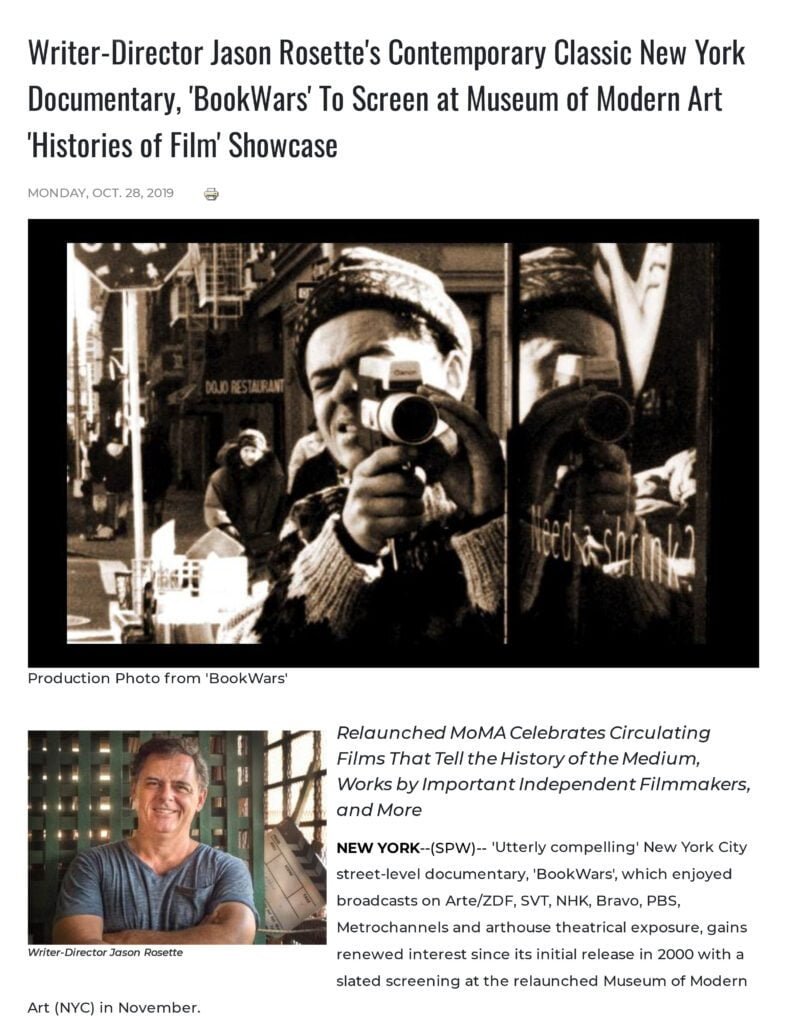


Comments are closed.